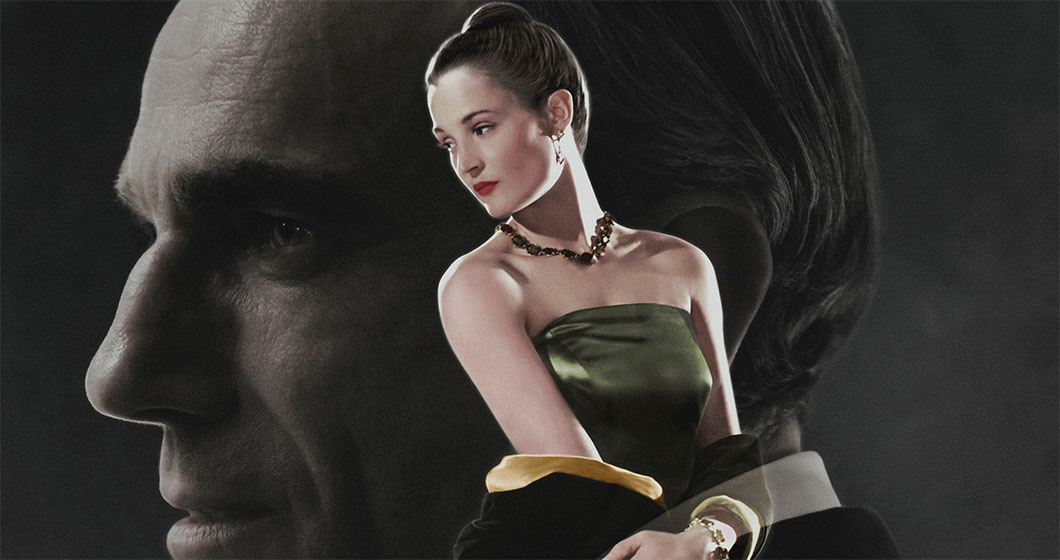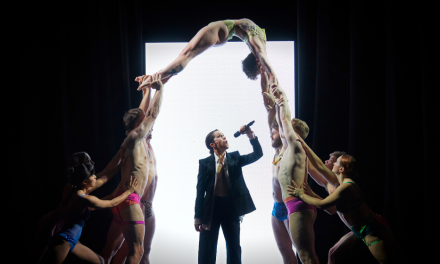Phantom Thread is the latest film from Paul Thomas Anderson that showcases the skilled director’s capacity for lateral growth. It’s also the last film of Daniel Day Lewis (he is apparently retiring from acting) and it’s both a reminder of why we’ll miss his performances and why it’s probably for the best, given his propensity for extreme levels of preparation. It’s only a matter of time before he puts himself through the ringer to play an Asian schoolgirl or something.
The plot could fit on a napkin. An eccentric, extremely skilled and highly sought after dress maker, Reynolds Woodcock, (Daniel Day Lewis) after a perfunctory break up, heads into the country, meets an unassuming girl, Alma (Vicky Kreips) and, despite the objections of Woodcock’s sister, Cyril (Lesley Manville) they struck up an unconventional relationship.
That’s it. That’s the entire plot. It’s a film that’s entirely made in the execution. And it’s incredible.
Let’s get the obvious out of the way – Daniel Day Lewis is great in it, like he always is. He apprenticed as a costume maker as research, just like he learned to box for ‘The Boxer,’ lived off the land for ‘The Last of the Mohicans’ and presumably presided over victory in a civil war for ‘Lincoln’. There are those who deride that kind of method acting and the debate about what it brings will go on, but with this film it’s hard to argue with.
The intensity with which Reynolds designs and sews would be difficult to fake, along with the complete disinterest in people. In fact, watch Reynolds’ eyes through the film. There’s all sorts of extremely specific touches, like how he blinks more when he looks at people and doesn’t blink at all while looking at clothes. There’s also the familiar way he move clothes around on a woman without it being the least bit selfconscious. It all communicates a man who has little interest in anything but his work.
And he’s well matched by the director. Paul Thomas Anderson continues to develop laterally as a director. I say that since, from the beginning of his career, he’s been fantastic, both in the clarity of his directorial voice and the quality of his films. The only way he’s needed to develop is to branch out into other styles. He started out with an impression of Robert Altman with ‘Boogie Nights’ and ‘Magnolia’ then made a Kubrick film with ‘There Will Be Blood’ and ‘The Master’ and found time for something unique in ‘Punch Drunk Love.’ With this, he imitates the British comedy of manners, the ‘Room with a View of a Pond and a Staircase’ style, to quote Eddie Izzard.
They’re films often derived from plays and so work with small casts. The entire film is in hushed, venomous silences, in terrible breaches of decorum, and everyone being very, very proper (until they aren’t, inevitably causing a scandal). Anderson slides right into it, just as he has before. It’s not a mark against the film that he is an American making this kind of film. After all, many of the best and most famous films and plays of this style were written by Noel Coward, a working-class boy whose work commented on the upper class from outside. And, similarly, Anderson’s position outside the film’s setting lets him see its flaws and the cracks in its facade.
And that’s largely what the film is about: the cracks and the flaws. Reynolds, for all his professional expertise, is a child. He hides it well with the help of his sister but he is in a state of arrested development. The petulant way he insists on particular foods, or rejoices when cream is available sounds acceptable thanks to the manners layered over it. His appearance is immaculate (I’ve never been frightened to watch hair being brushed before) but he’s always dressed and shot in such a way that the 6’2 Lewis looks tiny, like a boy in his first suit. He can be charming upon meeting someone, but quickly loses interest once the social rituals are over. Again, he can barely keep his eyes on people.
Everything is in the eyeline: who’s looking at who, when, and for how long. A seemingly vulnerable moment for Reynolds, where he meets Alma’s eye, is belied by the framing placing a dress in his eyeline.
The other players are also outstanding. Vicky Krieps holds her own opposite Lewis, no mean feat at all, and Lesley Manville expertly skewers people without ever saying more than a dozen words in a row. An all too brief appearance by Harriet Sansom Harris as an ageing heiress barely keeping it together shows the thin facade that everyone’s neuroses are hiding under.
This is not a film where a huge amount happens. It’s a small film with a cast of perhaps half a dozen speaking roles. It’s the sort of quiet film where deliberately putting too much butter in mushrooms while cooking them can be an act of purest spite to go along with a dagger smile. It’s also a film where the highs and lows of a tumultuous, unusual and possibly unhealthy relationship are right next to each other rather than being in stages, but neither are much bigger than a conversation at a table. It’s just done so goddamn well by people who are so absurdly talented that it’s palpably intense. It’s likely the only film that’ll ever make me worry about how I serve asparagus.
9/10
Reviewed at Palace Electric






